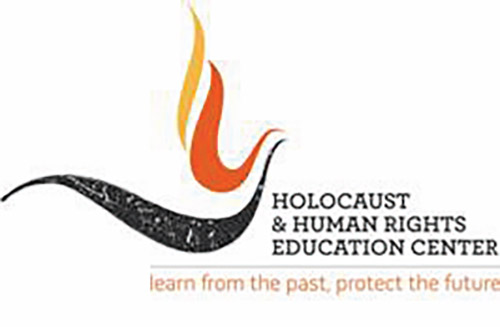





Since early May, the Holocaust and Human Rights Education Center (HHREC) in White Plains, New York has been inviting guests to attend a weekly “cocktail hour” on Thursday and/or Friday afternoons to hear HHREC members share their family’s Holocaust experiences.
As part of HHREC’s Memory Keepers: Generations Forward Speakers Series, members of the second and third generation of survivors have presented mesmerizing online testimonies to those sitting in the comfort and safety of their own homes. Stories are told from the “next generation” perspective, adding new meaning to the survivors’ powerful stories. Stories provide a thought-provoking window into the unimaginable consequences of human hate, and help individuals realize that their daily choices matter, that one person can make a difference, and that hope is important, regardless of the circumstances.
Ziporah Janowski, the daughter of two Holocaust survivors, lives in Croton-on-Hudson with her husband, David Ettenberg. She invited the community to join her for cocktails on Friday, June 12, when she spoke passionately about her parents Meier and Chana, and her experiences as a second generation survivor.
Ziporah’s father lived a prosperous life in the Polish town of Wolbrom, helping run the family’s businesses. Meier would answer her questions about the Holocaust but, as Ziporah said, “He would hold back the details.” He wanted to live his life with this family in the present, joyfully surrounded by his wife and three children. In 2009, Meier received a call from an Israeli cousin who had found his “Wolbrom Memorial Book,” written in Yiddish. It was customary for people to compile “town” memory books, containing letters, photos, poems and personal information. The book, translated into Hebrew, was an amazing revelation for Ziporah, who read her father’s brutal and devastating experiences, written in his own words, as she began “filling in the blanks” about his life.
In his memory book, Meier revealed the shocking details of his and his family’s deportation. All of the town residents were killed or quickly deported. He described the torture he endured throughout his journey through multiple labor camps and his imprisonment in Buchenwald, known for its cruel experiments on inmates, its constant death selections and onerous work camp.
On April 7, 1945, Meier was part of the infamous death march to Thierenstadt. Of the 30,000 prisoners on the march, one third died. Meier Janowski, Prisoner # 134143, survived.
Ziporah spoke lovingly of her father, with reverence for his strength, humility, his cleverness, his innate will to survive, and his determination to start a new life. On a reparations document, “an affidavit of torture” sent to Meier by the German government, she learned of the many ailments and experiences her father suffered.
With all he endured, Ziporah shared, “My father did not seek revenge. He sought a new life.”
Meier lost his young wife and child and all but three members of his very large family during the war. Upon liberation, he was sent to a Displaced Persons Camp in Germany, where he met his soon-to-be-wife, Hannah Mosler. The year was 1945. Meier was 34 years old and Chana was 20.
As Ziporah said, “They married not for love, but to live.”
Meier and Chana started over. Moving first to Israel and then to the United States, they settled in Brooklyn in 1956.
Ziporah is now beginning to research and write about her mother’s life. Chana did not share much of her life story with her children, but she was extremely fearful. Chana had nightmares about German shepherds barking and snarling; fear was her constant companion, preventing her from being the “good American mother” who could guide and instruct her daughter. Anti-Semitic comments from neighbors would terrify both mother and daughter.
Ziporah said, “I had to raise myself.”
Now, some six decades later, she reflected on her desire to “not be like my mother.” She has always sought to be tough, to achieve success and “to protect myself from the world.” She knows now that her mother’s inability to guide her into adulthood resulted from her disastrous, embittered childhood.
The ability of Ziporah’s parents to rise up from the ashes, to create a new life for themselves and their family, was difficult to achieve. And yet, somehow, they managed to do just that. Their accomplishments were always tempered with gratitude and joy. My parents “gave us what they had lost,” she said.
Ziporah’s presentation was, “…at its heart a love letter to her father, a reminder to all that family stories are precious and merit knowing and telling.” She is grateful to HHREC for establishing the Memory Keepers: Generations Forward Speaker Series, where she has been able to meet other second and third generation members.
At 5 p.m. on Thurday, June 18, community members are invited by Audrey Unger Reich to join her for cocktails, meet her father, Ron (Romek) Unger and hear his Holocaust story. In addition to telling her father’s story, Audrey has created artwork inspired by it. For Zoom login information, email Millie Jasper at mjasper@hhrecny.org
At 7 p.m. on Thursday, June 25, HHREC, in partnership with Congregation Emanu-El of Westchester-Rye, will present “From Son of a Nazi to Son of Israel: A Conversation with Dr. Bernd Wollschlaeger.” Growing up with his Nazi father’s ancient hatreds of the Jews, Dr. Wollschlaeger chose a different path that led him to Judaism, Israel and service in the IDF. Please contact Congregation Emanu-El for Zoom information at info@c-e-w.org or by calling (914) 967-0845.
On July 17, in partnership with Holocaust Memorial and Tolerance Center in Nassau County, HHREC will be represented by GenerationsForward speaker Ellen Kaidanow.









